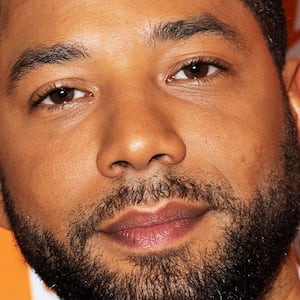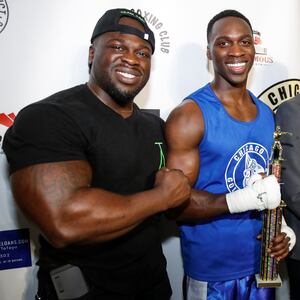Nearly a year after Chicago prosecutors made the shocking decision to drop all charges against Jussie Smollett for allegedly faking a hate crime against himself, a special prosecutor has indicted the former Empire actor for the January 2019 incident.
Smollett has been indicted on six counts of disorderly conduct for allegedly making false statements to the Chicago Police Department, according to Special Prosecutor Dan Webb, a former U.S. Attorney who was appointed to continue investigating the case and how it was handled by the Cook County State’s Attorney office.
“Smollett planned and participated in a staged hate crime attack, and thereafter made numerous false statements to Chicago Police Department officers on multiple occasions, reporting a heinous hate crime that he, in fact, knew had not occurred,” Webb’s office said in a statement, adding that further prosecution of Smollett is “in the interest of justice.”
Last year, prosecutors alleged Smollett, 37, filed a false police report that claimed he was the victim of a racist and homophobic attack on Jan. 29 in Chicago. In March 2019, the actor pleaded not guilty to 16 counts of disorderly conduct connected to the allegations, after police said the actor had paid two men to orchestrate the hate-crime attack in an effort to “promote his career.”
But later that month, the Cook County State’s Attorney’s Office decided to drop the charges after prosecutors reviewed the actor’s “previous community service” and “all the facts of circumstances of the case.” In exchange, the actor agreed to perform community service and forfeit his $10,000 bond to the city of Chicago.
“I want you to know that not for a moment was it in vain. I have been truthful and consistent on every single level since day one,” Smollett told reporters after the hearing. “I would not be my mother’s son if I was capable of one drop that I’ve been accused of.”
Webb said Tuesday the State’s Attorney office “has not been unable to provide” any “documented evidence” that they “relied on other dispositions of similar cases prior to the Smollett case that would justify” its controversial dismissal.
In a statement, Cook County State’s Attorney Kim Foxx questioned the “James Comey-like timing of that charging decision,” alleging that it “can only be interpreted as the further politicization of the justice system.”
The decision last year to drop the charges garnered harsh criticism from former Mayor Rahm Emanuel—who called it “a whitewash of justice”—and former Chicago Police Department Superintendent Eddie Johnson.
“Do I think justice was served? No,” Johnson said, months before he was fired for sleeping in a running car at a stoplight near his home. “I think this city is still owed an apology.”
Last year, Smollett alleged that two men in ski masks tried to tie a rope around his neck and poured a chemical substance on him as he walked home from a Subway sandwich shop. During the attack, Smollett alleged the men called him several homophobic and racist slurs, before shouting: “This is MAGA country.”
The allegation prompted Chicago police to open a hate-crime investigation—which quickly found multiple inconsistencies in the actor’s story and evidence that suggested he was involved in the incident. Police later said Smollett paid the Osundairo brothers $3,500 to orchestrate the attack.
The brothers, who have filed a lawsuit against two of Smollett’s attorneys for alleged defamation, said in a statement Tuesday they “are fully committed to the public knowing the truth about what occurred on January 29, 2019,” and are continuing to cooperate with authorities.
In February, Smollett was initially charged with one felony count of disorderly conduct for allegedly filing a fake police report. Less than a month later, a Cook County grand jury increased the charges to over a dozen felony counts after police alleged Smollett staged the hate crime because he was “dissatisfied with his salary” on the Fox show.
The next day, Smollett’s character was cut from the rest of Empire’s fifth season.
In April, the city of Chicago sued the actor to try to recoup the $130,000 police spent on the investigation in January 2019—prompting Smollet to file a countersuit, claiming that the prosecution was malicious and caused the actor extreme distress.









